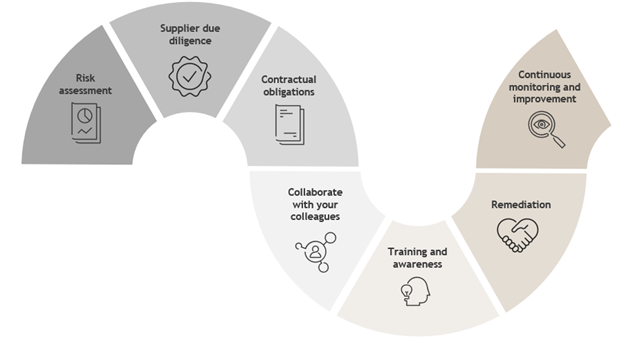
Supply chains can leave corporations unwittingly exposed to risks, reputation issues

In recent years, governments and businesses around the world have become increasingly aware of the need to address modern slavery within their operations and supply chains. Australia is no exception, with the Australian Government taking significant steps to tackle this issue through legislation.
It is now up to Australian businesses to be conversant with modern slavery risks, and organisations’ inhouse counsel have a role to play.
We share our tips for doing exactly that: playing a role.
“Modern slavery” is an umbrella term that is used to describe the serious violation of a person’s dignity and human rights. It includes several types of exploitative practices, such as human trafficking, slavery, forced labour, debt bondage, child labour and other offences under divisions 270 and 271 of the Criminal Code Act 1995 (Cth).
The latest figures from the International Labour Organisation estimated that around 50 million people globally were living in modern slavery in 2021.
Here’s the tricky part – even the most well-intentioned organisations can unknowingly become entangled in modern slavery.
The reality is that modern slavery may not directly be apparent. The biggest risk is often hidden within the intricate web of global supply chains, where you have the least oversight.
It’s important to recognise that it’s not just about you – it extends to who you do business with too.
In more ways than you probably imagined!
Here are a few key areas to think about:
Legal compliance: Under the Modern Slavery Act 2018 (Cth) (the Act), if your organisation’s annual revenue exceeds A$100 million, you need to submit an annual modern slavery statement to the Australian Government to (a) identify any modern slavery risks within your organisation and supply chain, and (b) report on the actions that you are taking to combat modern slavery. If you’re thinking that this doesn’t apply to you right now, be wary! If the Australian Government adopts the recommendations in the recently published report on the statutory review of the Act, you will also be captured if your organisation’s annual revenue is between A$50 million and A$100 million, with penalties for certain non-compliance. Start thinking about the legal and practical ramifications of becoming a reporting entity under the Act. It’s always better to be prepared than sorry!
Reputation: Any connection to modern slavery will tarnish your organisation’s reputation faster than a red wine mishap on a crisp white shirt. We’ve all experienced it – it’s unpleasant, tough to wash off and tends to stick around forever. Naturally, businesses that can demonstrate a commitment to ethical and responsible practices will have a competitive advantage in the market.
Ethical responsibility: Even if your organisation doesn’t have a legal obligation to comply with the Act, you have a moral obligation to ensure that you are not supporting or benefiting from modern slavery. It’s about doing the right thing and being a good corporate citizen. With the growing focus on ESG commitments, your customers, shareholders, investors and other stakeholders will look at the way you respond to modern slavery to make qualitative assessments to decide whether they want to do business with you or not.
Avoid a crisis: Addressing modern slavery risks is not only a legal and ethical responsibility but also a strategic imperative to safeguard your organisation’s continuity. Where connections to modern slavery are exposed, it can often set off a chain reaction of operational and organisational disruptions. This may include legal investigations, supply chain interruptions and financial loss.
What can I do to manage the risks?
There are several ways in which you can work with the business to manage modern slavery risks.

Risk assessment: Map out your operations and supply chain to understand where vulnerabilities may exist. This exercise involves assigning risk levels to each supplier according to their type and size, the product or service, their geographic location, and what you know about their typical labour practices and ethical standards.
Supplier due diligence: Conduct due diligence on your suppliers and business partners to assess their modern slavery risks before onboarding them. This may involve asking them to complete a questionnaire, site visits and/or audits, depending on their risk level.
Contractual obligations: Include modern slavery terms in your supplier contracts which require compliance with modern slavery laws, your Supplier Code of Conduct and reporting requirements. It should also outline consequences for non-compliance (such as immediate termination of contract).
Collaborate with your colleagues: You’re not doing this alone! Work closely with your colleagues in procurement, risk and compliance to integrate modern slavery considerations into supplier relationships and your organisation’s sourcing practices.
Training and awareness: Provide regular training (at least annually) to your personnel to recognise the signs of modern slavery and to report any concerns. Develop a clear and comprehensive modern slavery policy that outlines your organisation’s commitment to combatting modern slavery.
Remediation: Have a plan in place for addressing any identified instances of modern slavery within your operations or supply chain. This could tie in with your crisis management or business continuity plan.
Continuous monitoring and improvement: Modern slavery risks can evolve over time. Regularly review your supply chains, policies and processes to adapt to changing risks. Assess whether your existing framework is adequate to respond to potential future legislative changes.
Caroline Hayward is the General Counsel of King & Wood Mallesons. Sharon Ng is a Senior Legal Counsel in the Office of General Counsel at King & Wood Mallesons.